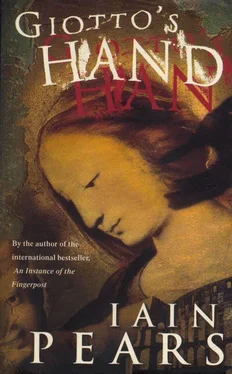Iain Pears - Giotto's Hand
Здесь есть возможность читать онлайн «Iain Pears - Giotto's Hand» весь текст электронной книги совершенно бесплатно (целиком полную версию без сокращений). В некоторых случаях можно слушать аудио, скачать через торрент в формате fb2 и присутствует краткое содержание. Город: London, Год выпуска: 1994, ISBN: 1994, Издательство: Harper Collins, Жанр: Исторический детектив, на английском языке. Описание произведения, (предисловие) а так же отзывы посетителей доступны на портале библиотеки ЛибКат.
- Название:Giotto's Hand
- Автор:
- Издательство:Harper Collins
- Жанр:
- Год:1994
- Город:London
- ISBN:978-0-00-232531-8
- Рейтинг книги:5 / 5. Голосов: 1
-
Избранное:Добавить в избранное
- Отзывы:
-
Ваша оценка:
- 100
- 1
- 2
- 3
- 4
- 5
Giotto's Hand: краткое содержание, описание и аннотация
Предлагаем к чтению аннотацию, описание, краткое содержание или предисловие (зависит от того, что написал сам автор книги «Giotto's Hand»). Если вы не нашли необходимую информацию о книге — напишите в комментариях, мы постараемся отыскать её.
Giotto's Hand — читать онлайн бесплатно полную книгу (весь текст) целиком
Ниже представлен текст книги, разбитый по страницам. Система сохранения места последней прочитанной страницы, позволяет с удобством читать онлайн бесплатно книгу «Giotto's Hand», без необходимости каждый раз заново искать на чём Вы остановились. Поставьте закладку, и сможете в любой момент перейти на страницу, на которой закончили чтение.
Интервал:
Закладка:
“Inspector Manstead,” she said. “Wants to say hello.”
Manstead, being a courteous man, had rung solely for the purpose of thanking Argyll for his assistance, and to tell him how enormously impressed he was, by Flavia’s deductive skills.
“I never really believed Forster was a thief, you know,” he confessed. “Just goes to show how wrong you can be. I doubt we’ll ever figure out how he died,” he said. “But that list of pictures you found is dynamite. A pity you didn’t notice it the first time you looked through his desk. But at least you had the gumption to look again.”
“Ah, yes,” Argyll said. “I left my pen behind. In the desk. I was just getting it back.”
“Amazing piece of luck it wasn’t burnt with all the rest of the papers. That damned wife of his. If it wasn’t for Flavia’s plea for clemency I’d nail Jessica Forster to the wall, the time she wasted.”
“Mercy is a fine thing,” Argyll said. “She suffered enough living with him, I think.”
“True. And she’s all but penniless, I gather. God only knows where Forster’s money went. He must have netted a packet from all the things he nicked.”
“Someone said something about gambling,” Argyll offered.
“Did they?” Manstead said in surprise. “I’d not heard that. I suppose that’s art dealers’ gossip, is it?”
“That sort of thing.”
“It’s not really important. If we recover the Pollaiuolo, that will be more than sufficient reward. I mean, we knew where it was, but now we have more indication that it was knowingly bought as a stolen painting it’ll be easier to get it back.”
“Was that on the list?” Argyll said with a sudden lurching feeling in his stomach as a penny dropped and clattered around somewhere at the bottom of his stomach.
“Of course. Why?”
“Nothing. Just that I didn’t notice. Too excited, I suppose. Tell me, was the Uccello on it as well?”
“Of course. The first one. Didn’t you read it at all? You must have been in a real daze.”
“Yes. A daze. That’s about it.”
His good mood dissipating fast as little details swept through his mind, laughing at him, he went back more sombrely to his half-cold egg. What had gone wrong? It was quite possible that he could make a mistake, but he didn’t believe that Flavia would have done. After all, she was good at this sort of thing. But of course, she was relying unusually heavily on information he had gathered. Left to her own devices, she would have made the connections. But as Argyll hadn’t detailed his burrowing in the Weller House archives, or his trips around graveyards, how could she possibly put the pieces together?
Still, maybe it was just a figment of his imagination, he told himself as he stared moodily at the toast. And maybe not, he added a few moments later when he opened and read a letter that the postman had delivered while he was on the phone. It delivered the coup de grâce .
It was from Lucy Garton, reporting that Italy Alex had finally taken a long lunch after an unprecedented period of devotion to duty, and she had grasped the opportunity to rummage through his files. It was not a happy letter. Peeved, in fact, as she reported that, despite Argyll’s firm belief, Geoffrey Forster had not sold any Italian paintings through her auction house.
Argyll more or less knew this by now, of course, so it came as no great shock. What did surprise him a little was the indignant announcement that in fact Forster had sold four pictures in the last couple of years and they had all been English. More to the point, one was attributed as being from the Weller House collection and it had been assessed by Lucy herself. She would stake her reputation on the assertion that it was, indeed, what he had said it was, and enclosed the auction catalogue to prove it. What, exactly was all this about, she went on? How was she supposed to win much-deserved promotion if Argyll didn’t deliver the goods? Did he realize how much that meal was going to cost him now?
Argyll looked at the indicated spot of the catalogue, and cursed the day he’d ever thought of going to see the damned woman. She had ringed lot forty-seven. A portrait, school of Kneller of Margaret Dunstan-Beaumont, sold for £1,250, provenance Weller House. A photocopied receipt for the sale was signed by Veronica Beaumont.
He shook his head in virtual disbelief. How could he have missed it? That bloody drawing had confused him, that was the reason, he thought. And it was just a question of simple arithmetic, really. Margaret Dunstan-Beaumont had died in 1680 at the age of sixty. Kneller had begun work in England in the mid-1670s. Therefore a Kneller portrait of Margaret Dunstan-Beaumont would have to show a woman of at least fifty-five.
His mind reeling with alarm as the implications came sweeping in on him, he walked down to the dining room and looked at the painting said to be of her with far more attention. It was filthy and still dark. Nonetheless, try as he might, there was no way he could persuade himself that it was the portrait of a fifty-year-old woman. The sitter was no more than twenty-five at best. So he looked closer, and even wetted his finger and rubbed it on the canvas.
Oh, you idiot, he thought miserably as the dirt thinned a little. It is a young woman. You don’t even need to clean it to see that. You even know what it is. You saw it on the wall of Bottando’s office a couple of years ago. Never again, he thought bitterly, will I think that good visual recall is a blessing.
He knew he should ring Flavia immediately, but also knew that, if he did turn out to be wrong, then his constant changing his mind would make Bottando seem like a complete fool. And his confidence about his ability to be right on anything was dwindling fast. On the other hand, if he was finally right, then this whole risky subterfuge that he’d recommended was unnecessary, if not worse. What should he do? Suddenly he felt his old self again, and the thrusting and dynamic alter ego withered and vanished. Damn good thing, considering how much trouble its brief appearance had caused.
To postpone the decision as long as possible, he walked to the bedroom and examined his beloved drawing once more, no longer the neglected orphan but now revealed as a prince in disguise. Now he knew the author, he was disappointed in himself for not having recognized the style the moment he first clapped eyes on it. The broad, confident and assured strokes of the pencil, the subtle way in which light and shade were merely suggested by a stroke here and there, the completeness of the whole thing. But it wasn’t the same: he had loved it; now he also knew that it was Leonardo, and had a watertight provenance traceable back to the artist’s pencil, he was merely awed by it.
He decided to give himself another half hour. Then he would make up his mind.
Forty-five minutes later, he concluded, reluctantly, that he had no choice. Flavia would have to know the full and complete truth. He could not, in good conscience, do anything other. It would be very difficult, but not disastrous as long as she got to Bottando before he started talking to the committee.
“Jonathan, it was awful,” she burbled down the phone before he could even finish saying hello.
“He’s already done it? I thought it was at four?”
“Brought forward.”
“Oh, my God! He told them the whole thing? About Forster being Giotto? He didn’t have any qualms about it?”
“Why should he have any qualms?”
There was a long pause as Argyll digested this.
“You mean you didn’t tell him?” he asked, rocking in anguished astonishment. “He went in to deliver this story about Forster not knowing it was entirely fictitious?”
“I didn’t have time,” she said a little defensively.
Читать дальшеИнтервал:
Закладка:
Похожие книги на «Giotto's Hand»
Представляем Вашему вниманию похожие книги на «Giotto's Hand» списком для выбора. Мы отобрали схожую по названию и смыслу литературу в надежде предоставить читателям больше вариантов отыскать новые, интересные, ещё непрочитанные произведения.
Обсуждение, отзывы о книге «Giotto's Hand» и просто собственные мнения читателей. Оставьте ваши комментарии, напишите, что Вы думаете о произведении, его смысле или главных героях. Укажите что конкретно понравилось, а что нет, и почему Вы так считаете.












